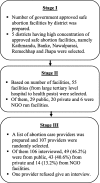Providers' perspectives on denial of abortion care in Nepal: a cross sectional study
- PMID: 30305079
- PMCID: PMC6180519
- DOI: 10.1186/s12978-018-0619-z
Providers' perspectives on denial of abortion care in Nepal: a cross sectional study
Abstract
Background: Despite legalization of abortion in Nepal in 2002, many women are still unable to access legal services. This paper examines providers' views, experiences with abortion denial, and knowledge related to abortion provision, and identifies areas for improvement in quality of care.
Methods: We conducted a structured survey with 106 abortion care providers at 55 government-approved safe abortion facilities across five districts of Nepal in 2017. We assessed reasons for denial of abortion care, knowledge about laws, barriers to provision and attitudes towards abortion.
Results: Almost all providers (96%) reported that they have ever refused clients for abortion services. Common reasons included beyond 12 weeks gestation (93%), sex selective abortion (86%), and medical contraindications (85%). One in four providers denied abortion for lack of drugs or trained personnel, and one third denied services when they perceived that the woman's reasons for abortion were insufficient. Only a third of providers knew all three legal indications for abortion -- less than or equal to 12 weeks of pregnancy on request, up to 18 weeks for rape or incest, and any time for maternal or fetal health risk. Overall, providers were in favor of legal abortion but a substantial proportion had mixed or negative attitudes about the service.
Conclusions: Improvements in training to address providers' inadequate knowledge about the abortion law may reduce inappropriate denial of abortion. Establishing referral networks in the case of abortion denial and ensuring regular supply of medical abortion drugs would help more women access abortion care in Nepal.
Keywords: Abortion; Denial of care; Nepal; Provider training; Providers; Quality of care; Referrals.
Conflict of interest statement
Ethics approval and consent to participate
The study was approved by the Ethical Review Board of the Nepal Health research Council, Nepal (Reg #152/2017). At the start of each interview, participants were asked to review and sign an informed consent form. They were given the opportunity to ask as many questions as they had regarding the study overall and the interviews specifically. After obtaining signed informed consent, a trained researcher conducted the interview in a private room in each facility and in the Nepali language.
Consent for publication
Not applicable.
Competing interests
The authors declare that they have no competing interests.
Publisher’s Note
Springer Nature remains neutral with regard to jurisdictional claims in published maps and institutional affiliations.
Figures
Similar articles
-
Denial of legal abortion in Nepal.PLoS One. 2023 Mar 21;18(3):e0282886. doi: 10.1371/journal.pone.0282886. eCollection 2023. PLoS One. 2023. PMID: 36943824 Free PMC article.
-
Knowledge and attitudes towards abortion from health care providers and abortion experts in Zimbabwe: a cross sectional study.Pan Afr Med J. 2019 Oct 16;34:94. doi: 10.11604/pamj.2019.34.94.18107. eCollection 2019. Pan Afr Med J. 2019. PMID: 31934237 Free PMC article.
-
"Sometimes they used to whisper in our ears": health care workers' perceptions of the effects of abortion legalization in Nepal.BMC Public Health. 2012 Apr 20;12:297. doi: 10.1186/1471-2458-12-297. BMC Public Health. 2012. PMID: 22520231 Free PMC article.
-
Providing safe abortion services: Experiences and perspectives of providers in South Africa.Best Pract Res Clin Obstet Gynaecol. 2020 Jan;62:79-89. doi: 10.1016/j.bpobgyn.2019.05.005. Epub 2019 May 20. Best Pract Res Clin Obstet Gynaecol. 2020. PMID: 31279763 Review.
-
Providing medical abortion services through pharmacies: Evidence from Nepal.Best Pract Res Clin Obstet Gynaecol. 2020 Feb;63:67-73. doi: 10.1016/j.bpobgyn.2019.06.003. Epub 2019 Jul 5. Best Pract Res Clin Obstet Gynaecol. 2020. PMID: 31331742 Review.
Cited by
-
Providers' experiences with abortion care: A scoping review.PLoS One. 2024 Jul 1;19(7):e0303601. doi: 10.1371/journal.pone.0303601. eCollection 2024. PLoS One. 2024. PMID: 38950040 Free PMC article.
-
Policies and actions to reduce maternal mortality in Nepal: perspectives of key informants.Sex Reprod Health Matters. 2021;29(2):1907026. doi: 10.1080/26410397.2021.1907026. Sex Reprod Health Matters. 2021. PMID: 33821780 Free PMC article.
-
Self-assessment of attitudes towards conditions to provide safe abortion among new medical graduates in Thailand, 2018: an application of cross-sectional survey with factor analysis.BMC Womens Health. 2021 Jul 27;21(1):273. doi: 10.1186/s12905-021-01412-3. BMC Womens Health. 2021. PMID: 34315442 Free PMC article.
-
Assessing feasibility and acceptability of increasing access to sexual and reproductive health and rights through pharmacy outlets and community health volunteers: lessons from pilot study in Kenya.BMC Health Serv Res. 2024 Dec 30;24(1):1663. doi: 10.1186/s12913-024-12176-5. BMC Health Serv Res. 2024. PMID: 39736716 Free PMC article.
-
Striving toward safe abortion services in Nepal: A review of barriers and facilitators.Health Sci Rep. 2024 Feb 22;7(2):e1877. doi: 10.1002/hsr2.1877. eCollection 2024 Feb. Health Sci Rep. 2024. PMID: 38390351 Free PMC article.
References
-
- Ministry of Health. Safe Abortion Service Guidelines. Kathmandu Family health Division, Ministry of Health; 2017: http://www.fhd.gov.np/images/pdf/Revised-SAS-Guideline-2074%2D%2Dfinal.pdf . Accessed 15 July 2017.



